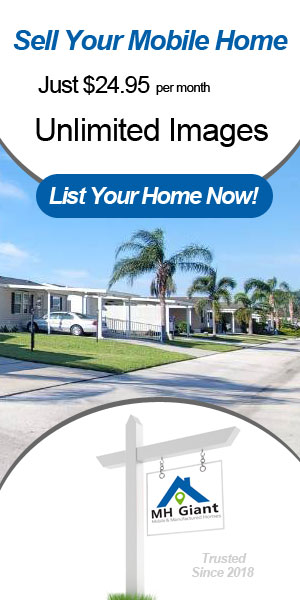Table of Contents
Selling a mobile home can be both exciting and overwhelming.
Whether you’re upgrading, downsizing, or relocating, the process requires planning, awareness, and strategy. Unfortunately, many mobile home owners fall into avoidable traps that delay the sale, decrease the value of the home, or cause legal headaches.
To help you sell your mobile home faster and for the best possible price, we’ve compiled a list of the top 5 mistakes to avoid when selling your mobile home. Learn from the missteps of others, and position yourself for success.
 Mistake #1: Not Knowing the Type of Ownership You Have
Mistake #1: Not Knowing the Type of Ownership You Have
Before you even list your mobile home, it’s crucial to understand what you’re actually selling, and how it’s classified.
Is it personal property or real estate?
Mobile homes can fall under two main classifications:
- Personal Property: If your home is on leased land (such as in a mobile home park), it’s likely considered personal property. In this case, it’s treated more like a vehicle and transferred with a title.
- Real Estate: If your mobile home is permanently affixed to land that you own, it might be considered real property. In this case, it’s treated more like a traditional house, involving deeds and potentially requiring a real estate agent.
Why it matters:
The classification affects everything from the selling process, legal requirements, paperwork, financing options for buyers, and taxation.
How to avoid this mistake:
- Contact your local DMV or housing authority to determine your mobile home’s classification.
- If your mobile home is on rented land, confirm the park’s rules about selling to outside buyers.
- If you’re unsure, consult a real estate attorney or mobile home broker.
Mistake #2: Setting the Wrong Price
One of the biggest mistakes mobile home sellers make is mispricing their property. Pricing too high can turn off buyers and cause your home to sit on the market. Pricing too low can leave money on the table.
Factors that affect your mobile home’s value:
- Age and condition of the home
- Location and lot rent (if applicable)
- Size, layout, and features
- Market demand
- Whether the home is on owned or rented land
- Recent sales of comparable homes
Common pricing pitfalls:
- Relying solely on what you paid for the home
- Ignoring current market conditions
- Overvaluing upgrades or renovations
- Assuming buyers will “make an offer” if the price is too high
How to avoid this mistake:
- Get a professional appraisal or comparative market analysis (CMA).
- Research recent mobile home sales in your area.
- Consider working with an experienced mobile home broker or real estate agent who understands the market.
Pro tip: You can also use mobile home valuation tools online, but take them with a grain of salt, they don’t always account for local conditions or park-specific considerations.
 Mistake #3: Skipping Necessary Repairs and Upgrades
Mistake #3: Skipping Necessary Repairs and Upgrades
Just like traditional homes, mobile homes benefit from being presented in their best possible condition. Sellers often assume buyers will be willing to “fix it up,” but the truth is most buyers want a home that’s move-in ready, or they’ll use issues as a bargaining chip to lower the price.
Why skipping repairs is a mistake:
- It creates a poor first impression.
- It invites lowball offers.
- It lengthens the time your home sits on the market.
- It may cause financing issues if the home fails inspections.
Common repair areas to address:
- Leaky roofs or plumbing issues
- Soft spots in floors or sagging subflooring
- Damaged siding or skirting
- Broken windows or doors
- Outdated or non-functioning appliances
- Electrical issues or outdated wiring
Simple upgrades that offer a big return:
- Fresh paint (inside and out)
- New flooring or cleaned carpets
- Updated light fixtures
- Landscaping or curb appeal improvements
- Clean, clutter-free staging
How to avoid this mistake:
- Conduct a pre-listing inspection to identify any major issues.
- Budget for minor repairs and cosmetic improvements.
- Consider offering buyers a home warranty to ease concerns about older systems.
Remember: Small investments upfront often result in a higher sale price and faster closing.
Mistake #4: Poor Marketing and Incomplete Listings
Even the nicest mobile home won’t sell if nobody knows it’s available, or if the listing doesn’t grab attention. Many sellers rely on word of mouth or put up a single sign in their yard, hoping someone stumbles upon it. In today’s market, that’s simply not enough.
Marketing mistakes to avoid:
- Low-quality or no photos
- Vague or incomplete descriptions
- Not listing on major platforms
- Not highlighting key features
- Ignoring social media or local community groups
What buyers want to see:
- High-resolution photos of the interior and exterior
- A clear and honest description of the home’s size, features, and condition
- Details about the lot (rented or owned), monthly costs, and location perks
- Community amenities (pool, clubhouse, pet-friendly, etc.)
- Any recent updates or energy-efficient improvements
Where to market your mobile home:
- Mobile home-specific platforms like MH Giant
- Facebook Marketplace and local “buy/sell” groups
- Craigslist (be cautious of scams)
- Real estate listing services (if applicable)
- Flyers or bulletin boards in community centers
How to avoid this mistake:
- Take high-quality photos during the day with natural lighting.
- Create a compelling, detailed listing that highlights the best features of your home.
- Consider hiring a photographer or videographer for virtual tours.
- Promote your listing on multiple platforms, and keep it updated.
Remember: The more eyes on your listing, the better chance of finding the right buyer.
 Mistake #5: Not Understanding the Legal Process or Required Paperwork
Mistake #5: Not Understanding the Legal Process or Required Paperwork
Selling a mobile home involves legal steps that vary by state, and failing to complete them correctly can delay your sale, or worse, get you into legal trouble later.
Common legal and paperwork issues:
- Not having the title ready or resolving title issues
- Not providing a proper bill of sale
- Failing to disclose known issues
- Not obtaining park approval for the buyer (if in a community)
- Not understanding tax implications or transfer fees
Each sale may require:
- The mobile home title (like a car title)
- A signed bill of sale
- Transfer of ownership documents
- Proof of taxes paid
- Park management approval forms (if applicable)
- Disclosure forms about the home’s condition
How to avoid this mistake:
- Contact your state’s Department of Housing or DMV for mobile home sales requirements.
- Check if your park has specific rules for selling your home and approving new tenants.
- Have your title, tax records, and all relevant paperwork ready.
- Consider using a mobile home broker or attorney if the sale involves land or is complicated.
Bonus tip: Always get everything in writing. Verbal agreements can lead to confusion or disputes.
Bonus Section: Tips for a Smooth Mobile Home Sale
Avoiding these five major mistakes will put you miles ahead, but here are a few more helpful tips to ensure everything goes smoothly:
1. Be realistic and flexible.
Even if you love your home, try to look at it objectively. Listen to buyer feedback and be open to negotiation.
2. Work with the right professionals.
Mobile home transactions aren’t always handled well by traditional agents. Look for professionals who specialize in manufactured homes, especially in your area.
3. Know your timeline.
Do you need to sell quickly? Or are you willing to wait for the best offer? Understanding your own priorities can help guide pricing and strategy decisions.
4. Keep it clean and show-ready.
Make your mobile home sparkle. A clean, welcoming space helps buyers picture themselves living there.
5. Stay organized.
Keep all documents, repair records, receipts, and communication in one place. Being organized builds trust and speeds up the process.
Set Yourself Up for Success
Selling a mobile home doesn’t have to be a stressful experience, but it does require preparation and awareness. By avoiding these five common mistakes, misunderstanding your ownership status, mispricing your home, skipping repairs, poor marketing, and overlooking legal requirements, you’ll significantly improve your chances of a fast, profitable, and stress-free sale.
Whether you’re selling your mobile home on your own or working with a professional, staying informed and proactive is key. Put in the effort now, and you’ll reap the rewards when that “Sold” sign goes up.
Have questions about selling your mobile home? Want a free checklist to get started? Drop a comment or reach out, we’re here to help you every step of the way.

 Mistake #1: Not Knowing the Type of Ownership You Have
Mistake #1: Not Knowing the Type of Ownership You Have Mistake #3: Skipping Necessary Repairs and Upgrades
Mistake #3: Skipping Necessary Repairs and Upgrades Mistake #5: Not Understanding the Legal Process or Required Paperwork
Mistake #5: Not Understanding the Legal Process or Required Paperwork